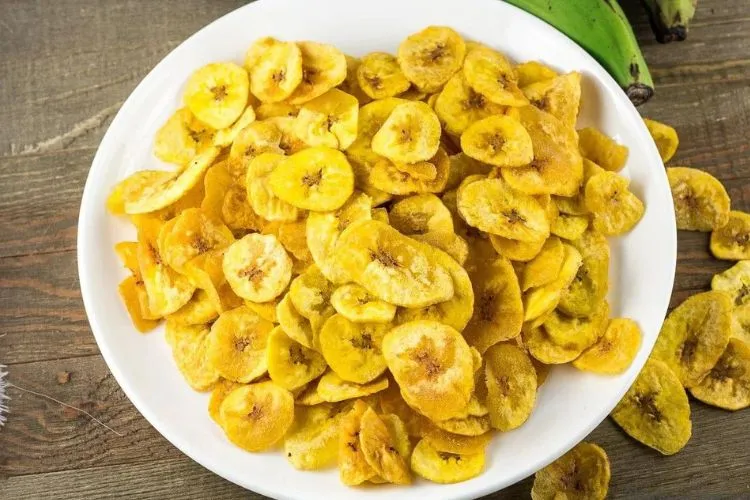In the world of pet care, the dietary habits of our feline friends are often a topic of much curiosity and concern. As cat owners explore the realm of human foods that may or may not be safe for their pets, plantain chips emerge as a subject of intrigue. So, can cats have plantain chips?
This article delves into whether these popular snacks can be a part of a cat’s diet, considering their carnivorous nature and specific nutritional needs.
Understanding the potential implications of feeding plantain chips to cats is crucial for ensuring their health and well-being.
🐾 Can cats have plantain chips?
Cats should generally not eat plantain chips. While plantains themselves aren’t toxic to cats, the chips are often fried and heavily seasoned.
The high fat content from frying can be hard for cats to digest and may lead to gastrointestinal upset or more serious conditions like pancreatitis.

Additionally, the salt and other seasonings typically found on these chips can be harmful to cats, potentially causing salt toxicity if consumed in large amounts.
It’s important to feed cats a diet specifically tailored to their nutritional needs, which typically consist of high-quality, meat-based cat food.
If you want to give your cat a treat, it’s best to opt for something designed for them or a small piece of cooked plain meat. Always consult with your veterinarian before introducing new foods into your cat’s diet.
🐾 The Nutritional Content and Potential Risks of Feeding Plantain Chips to Cats
Nutritional Content of Plantain Chips
Plantain chips, a popular snack among humans, are made from sliced plantains that are either fried or baked.
While they are a source of dietary fiber, vitamins (such as Vitamin A and Vitamin C), and minerals (including potassium), their nutritional profile is tailored to human, not feline, dietary requirements.
Unlike the natural prey diet of cats, plantain chips are high in carbohydrates and fats, components that are not essential in high amounts for cats.
Potential Risks
- Digestive Issues: The high carbohydrate and fat content in plantain chips can lead to digestive issues in cats, including upset stomach and diarrhea. Cats have a limited ability to digest plant-based foods efficiently, making it difficult for them to process the complex carbohydrates in plantains.
- Toxic Ingredients: The seasoning added to plantain chips, such as garlic or onion powder, can be toxic to cats. Even small amounts of these ingredients can cause serious health issues, including damage to red blood cells leading to anemia.
- Obesity and Related Health Problems: Regular consumption of high-fat, high-calorie snacks like plantain chips can contribute to obesity in cats. Obesity in turn increases the risk of diabetes, liver problems, and joint issues.
- Choking Hazard: The texture and size of plantain chips might pose a choking risk, especially for smaller cats or those that tend to eat quickly without chewing properly.
While plantain chips might seem like a harmless treat, their nutritional content is not suited to the dietary needs of cats, and the potential risks far outweigh any perceived benefits.
Cat owners should prioritize feline-specific treats that cater to their pets’ carnivorous diet and consult with a veterinarian before introducing new foods into their cats’ diet.
🐾 Safer Alternatives to Plantain Chips for Cats
While plantain chips may not be the ideal treat for cats, pet owners can explore safer and more nutritious alternatives that align with a cat’s dietary needs. Here are some recommendations:

Commercial Cat Treats
- High-Protein Treats: Look for treats that are high in protein and low in carbohydrates, mimicking the natural diet of a cat. These treats often feature chicken, fish, or other meats as their primary ingredient.
- Dental Chews: Dental chews are designed not only to be a treat but also to help maintain dental health, reducing tartar and plaque buildup.
Homemade Treats
- Cooked Meats: Small pieces of cooked chicken, turkey, or fish can be a healthy treat option. Ensure these are cooked without any harmful seasonings or oils.
- Pureed Pumpkin: A small amount of pureed pumpkin (not the pie filling) can be a fiber-rich treat that aids in digestion. However, it should be given in moderation.
Fresh Snacks
- Small Pieces of Fruits and Vegetables: While fruits and vegetables are not a natural part of a cat’s diet, small amounts of cat-safe options like melon or cucumber can be offered occasionally as a treat. Ensure these are free from seeds and pits.
Consultation with a Veterinarian
It’s crucial to remember that treats should only make up a small portion of your cat’s diet and not replace their regular, nutritionally complete meals.

Always consult with a veterinarian before introducing new treats into your cat‘s diet, especially if your cat has specific health concerns or dietary restrictions.
By choosing treats that align with a cat’s nutritional needs, owners can ensure their pets enjoy a healthy and balanced diet, free from the potential risks associated with inappropriate human foods like plantain chips.
In unraveling the mystery of whether cats can have plantain chips, it’s interesting to explore other food-related misconceptions. Like, many question, ‘Can Cats Eat Donuts?‘ or ask about the suitability of ‘Can Cats Eat Almond Butter?‘ Stay informed about your cat’s diet and health. Stay with us!
Conclusion:
While plantains by themselves are not poisonous to cats, plantain chips are not a recommended snack for our feline friends. The additional ingredients and cooking methods used to make plantain chips cater to human tastes rather than feline health.
High in fats, salts, and spices, these crispy treats can pose health risks ranging from digestive upset to more serious conditions like pancreatitis and salt toxicity.
To ensure your cat maintains a balanced diet and optimal health, stick to high-quality cat food and vet-approved treats.
Always prioritize your pet’s long-term well-being over the temporary pleasure of human snacks, no matter how much they seem to beg for a taste. When in doubt, consult your veterinarian for advice on safe dietary options for your cat.
